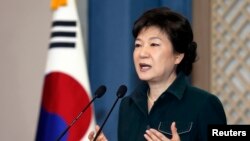SEOUL —
South Korea is expressing concern and frustration with North Korea's continuing bellicose rhetoric, which includes threats of a preemptive nuclear strike. VOA Correspondent Steve Herman has details from Seoul.
South Korean president Park Geun-hye, speaking to graduating military cadets Friday, informed them she will “deal strongly with North Korea's provocations.”
The president says the “current security situation is very grave” as Pyongyang presses ahead with nuclear and missile development, and threatens to nullify the 1953 armistice agreement.
In recent days North Korea has also warned it would attack with nuclear weapons the headquarters of its enemies - which would be the United States and South Korea.
On Friday the North's organization overseeing relations with the South (the Committee for the Peaceful Reunification of Korea) declared void a non-aggression pact with Seoul and announced the North-South hotline at the DMZ will be severed.
At a rally in Pyongyang Thursday, a general told the crowd the military has armed intercontinental ballistic missiles and other guided rockets with various types of atomic warheads.
Kim Min-seo, a spokesman for South Korea's Defense Ministry, says, if the North were to carry out a nuclear attack against the South “the Kim Jong Un regime would become extinct from the planet by the will of mankind, as well as South Korea.”
A professor of North Korean studies at Seoul's Dongguk University, Kim Yong-hyun, says the latest threats from Pyongyang are clearly intended to heighten as much as possible tensions on the peninsula.
Kim says the possibility that North Korea will take a low-intensity provocative action, such as firing short-range missiles in the vicinity of the disputed Yellow Sea maritime border (the Northern Limit Line), cannot be excluded.
North Korea's threats come as the U.N. Security Council toughens sanctions against Pyongyang in the wake of its third nuclear test.
China's backing of the fresh and tighter sanctions is seen as a sign of Beijing's increasing frustration with Pyongyang's behavior.
China sent soldiers to fight alongside North Korea during the devastating civil war on the peninsula in the early 1950s. Beijing remains Pyongyang's sole, significant ally.
The United States has nearly 30,000 military personnel stationed in South Korea.
The two countries are currently conducting annual defense drills in South Korea.
The North has called the exercises a prelude to an American nuclear strike on it. And Pyongyang's military is also reported currently to be conducting its own ground, air and sea military exercises.
South Korean president Park Geun-hye, speaking to graduating military cadets Friday, informed them she will “deal strongly with North Korea's provocations.”
The president says the “current security situation is very grave” as Pyongyang presses ahead with nuclear and missile development, and threatens to nullify the 1953 armistice agreement.
In recent days North Korea has also warned it would attack with nuclear weapons the headquarters of its enemies - which would be the United States and South Korea.
On Friday the North's organization overseeing relations with the South (the Committee for the Peaceful Reunification of Korea) declared void a non-aggression pact with Seoul and announced the North-South hotline at the DMZ will be severed.
At a rally in Pyongyang Thursday, a general told the crowd the military has armed intercontinental ballistic missiles and other guided rockets with various types of atomic warheads.
Kim Min-seo, a spokesman for South Korea's Defense Ministry, says, if the North were to carry out a nuclear attack against the South “the Kim Jong Un regime would become extinct from the planet by the will of mankind, as well as South Korea.”
A professor of North Korean studies at Seoul's Dongguk University, Kim Yong-hyun, says the latest threats from Pyongyang are clearly intended to heighten as much as possible tensions on the peninsula.
Kim says the possibility that North Korea will take a low-intensity provocative action, such as firing short-range missiles in the vicinity of the disputed Yellow Sea maritime border (the Northern Limit Line), cannot be excluded.
UN Security Council Resolution 2094
UN Security Council Resolution 2094- Condemns in strongest terms North Korea's ongoing nuclear activities
- Imposes new financial sanctions to block transactions in support of illicit activities
- Strengthens states' authority to inspect cargo, deny port, overflight access
- Enables stronger enforcement of sanctions by U.N. member states
- Imposes sanctions on new individuals and entities
China's backing of the fresh and tighter sanctions is seen as a sign of Beijing's increasing frustration with Pyongyang's behavior.
China sent soldiers to fight alongside North Korea during the devastating civil war on the peninsula in the early 1950s. Beijing remains Pyongyang's sole, significant ally.
The United States has nearly 30,000 military personnel stationed in South Korea.
The two countries are currently conducting annual defense drills in South Korea.
The North has called the exercises a prelude to an American nuclear strike on it. And Pyongyang's military is also reported currently to be conducting its own ground, air and sea military exercises.





